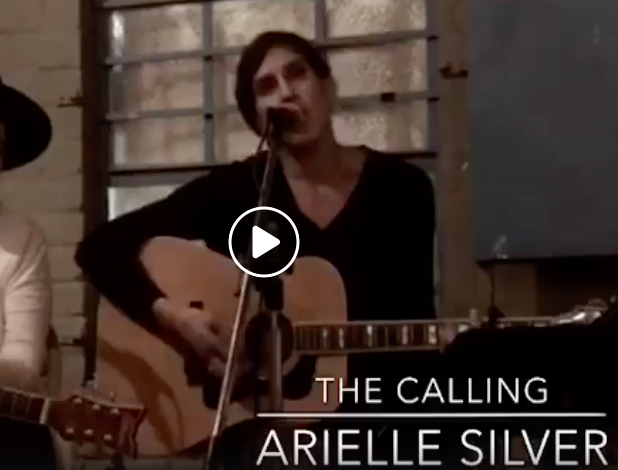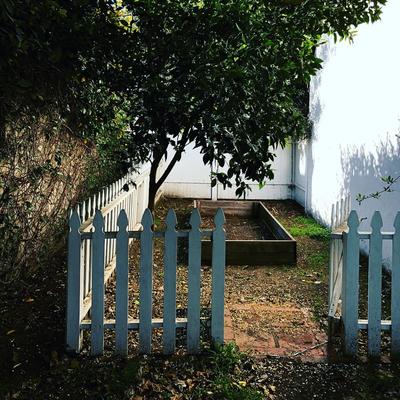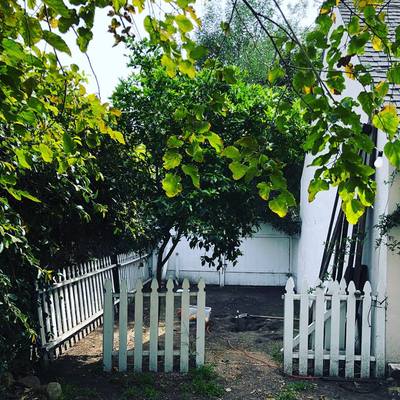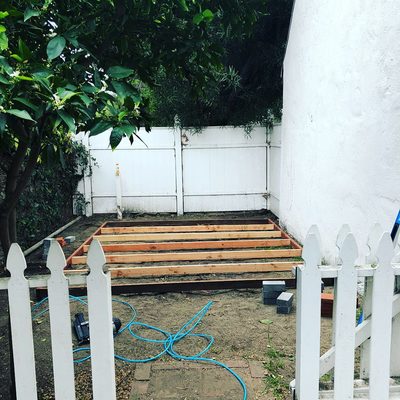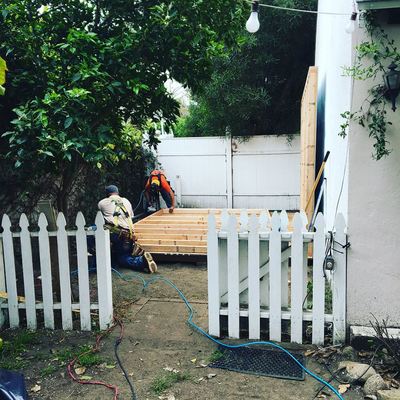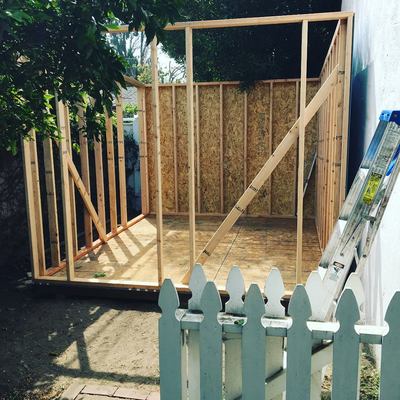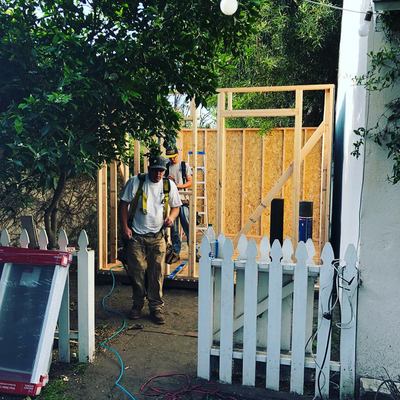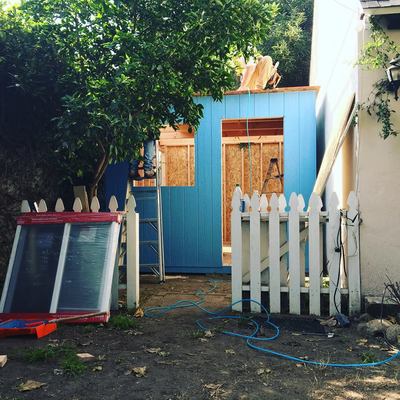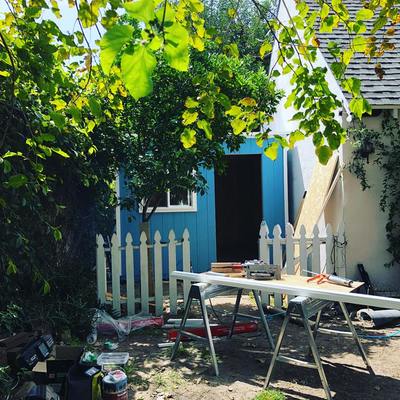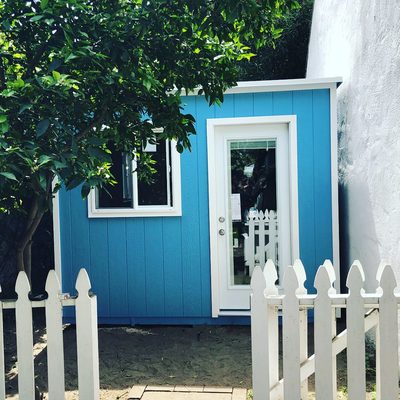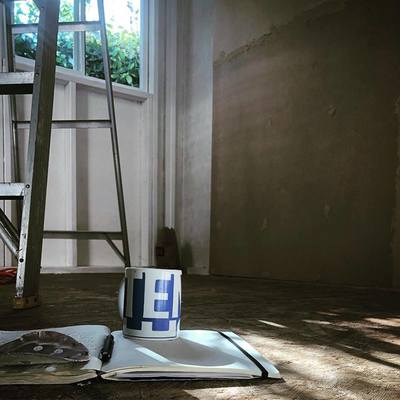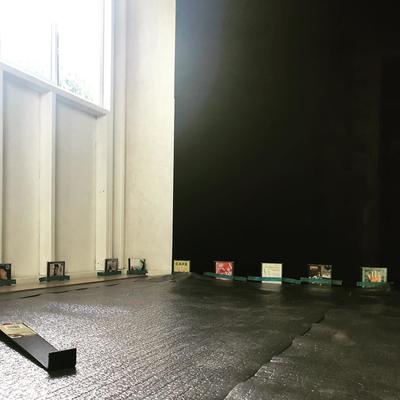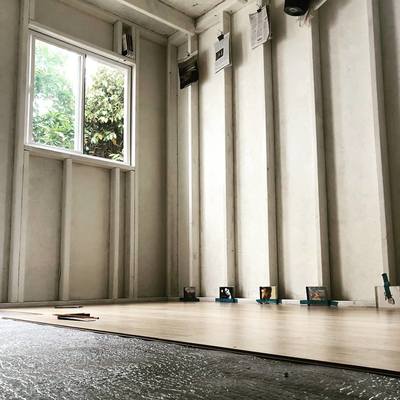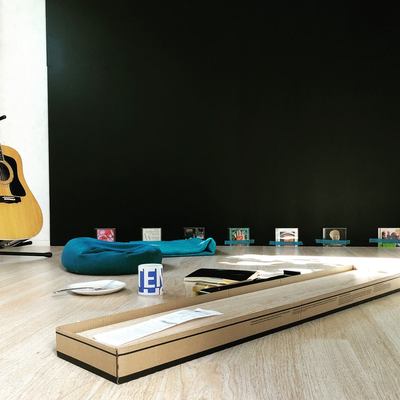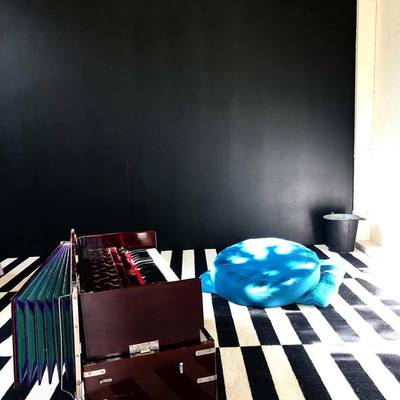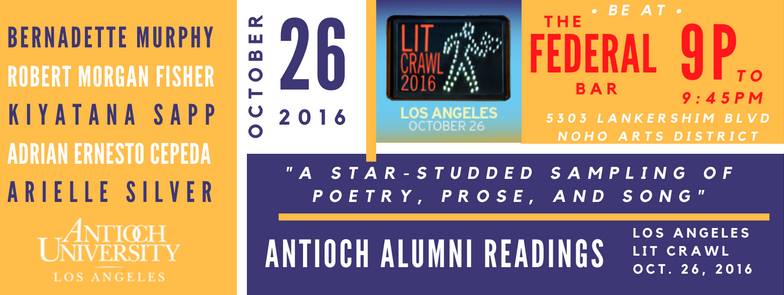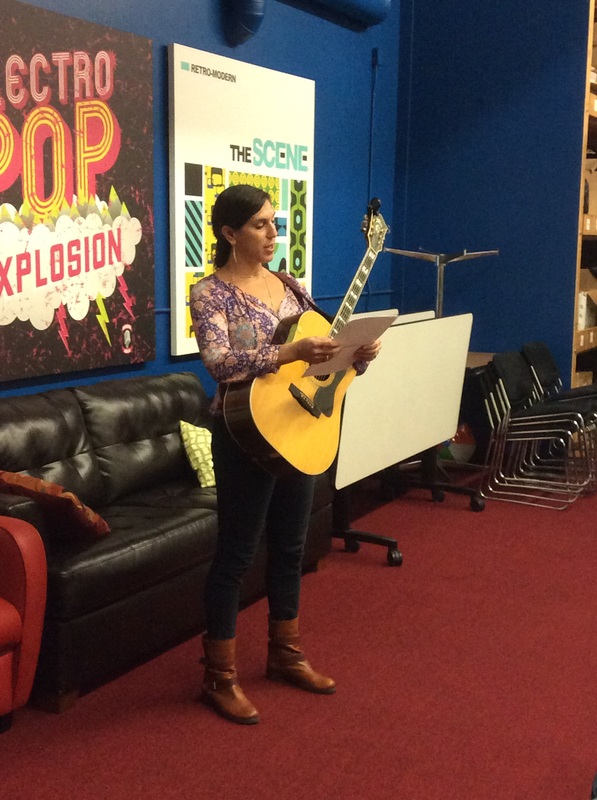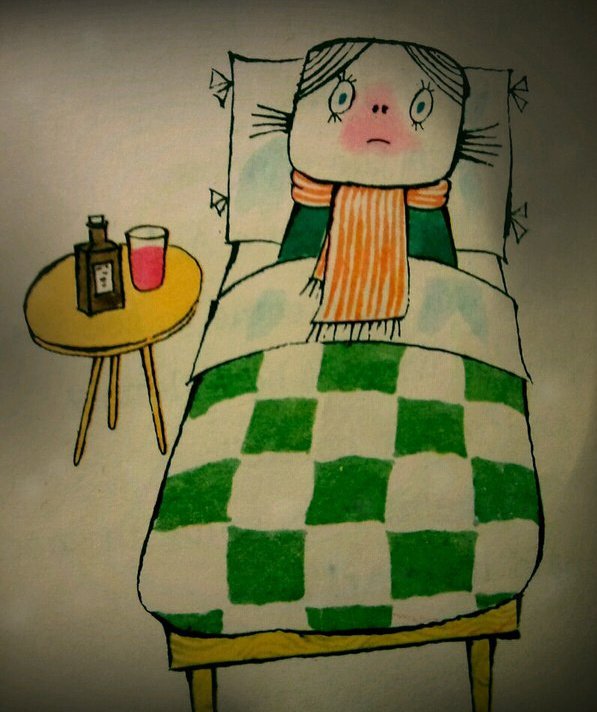|
Last week, I caught one of those unwanted autumn colds that blows in unexpectedly just as the days warm for a quick Indian summer rebound. Being of hearty stock, I figured it would run its course and be gone by week's end. Instead, it settled into my chest, clenched my voice into a scratchy rasp, rifled through my schedule and canceled my weekend plans. Sunday and Monday were all tea and cough drops, but on Tuesdays I'm down at the college to teach, and by Wednesday my voice was entirely gone. Friday night had a gig scheduled, one that I'd been greatly anticipating not for its glamour (since, on the back patio of an urban bookstore, it certainly had none), but because I planned to sing new songs in front of an audience for the first time. With my voice shot, I couldn't rehearse, and as Thursday turned into Friday, I didn't even know if I'd have enough voice to sing on stage.
The last time I lost my voice, it was metaphor. I could talk and sing, if I wanted to, but I lacked the desire. The sudden desire to not sing, after years of desiring the opposite, took me by surprise. I tested myself time and again, played a few gigs here and there, to see if I'd really lost it. Eventually I stopped trying; the desire was inexplicably gone. With nothing else to do, I practiced a lot of yoga and took up running. I noted with curiosity the cycles of fruit, leaves, and clouds in southern California's subtle shift of seasons. Those changes might have escaped my observation if life had been louder, and my quietude also revealed gaps in some of the foundational logic on which I'd built my life. My former marriage fell away. As inner listening tends to do, I developed new awareness of my own inner workings. I became accustomed to silence's hard questions, and learned to endure the disquieting geological time scale in which difficult answers are disclosed. Among other things, I discovered, for the first time, something in myself resembling trust or faith. I wondered, during those years of silence, if I would ever come back to writing songs, if I would ever again want to sing them. They say that the Universe will test you. It will throw obstacles in your path to check your dedication to the thing you appear to want. How bad do you want it? the Universe will ask, and if you crumble and skulk back to your room, the Universe will have proven its point. That's what I thought, it will say. But if you really want it, you dig deeper. You find a way to get over, get around, or work with the obstacles. And the Universe will sit back in its chair and say, Oh really? Now look at you, kid. Tenacious little thing, aren't you? After a long decade of weird absence, the desire to create music returned to me. Maybe I needed that time to attend to rebuilding my foundation. Maybe I needed to find some faith. While I did that, my voice had run off on sabbatical. It's reappeared now full of stories from its travels, and for the last few months I've been writing those stories into songs. When this cold swiped my voice, I considered canceling the gig. Especially on Thursday night, I began to contemplate how I might contend with things if my voice never returned (oh, how illness turns me pessimistic). But on Friday I woke hearing the Universe asking, How badly do you want it?
0 Comments
The information age! What a difference it is, starting out as an indie musician (as I feel I am doing, once again) and being an indie musician in the '90s / '00s. Back when I started playing gigs, we collected names and street addresses for our mailing lists, and mailed out postcards (with stamps!) every month to our fans. The way people got "free" music back then was by riding the subway -- and hearing the buskers play on the platforms.
Lately I've been appreciating the number of resources that are now available to indie artists. It can be overwhelming, so I thought I'd share a few of the rabbit holes I've been running down lately. If you have others you think I should know about, email me and I'll check them out. WEBSITES / COACHING / SERVICES
PODCASTS
I could go crazy on a night like tonight When summer's beginning to give up her fight And every thought's a possibility And the voices are heard but nothing is seen Why do you spend this time with me Maybe an equal mystery - from "Mystery" by the Indigo Girls My letter writing this summer went to the birds because I've been tingling with creative endeavors so nascent and fragile that I haven't known how to write about them. They were born in the shed, the magic little house that went up between the back fence and the orange tree in April. Even in February, though, when I first started clearing out the space, I felt something simmering. Two voices vied in my head as I dug up the old garden and paid the contractor: Nothing you do will prove the worth of this cost. And, defiantly, quietly, truthfully: It's worth it to me. When the plywood room was finally erected with a glass door fitted with blinds and two windows that slide open for a breeze, I painted the walls, laid the flooring, and felt pulled.... pulled... I almost couldn't tell anyone, almost couldn't voice it... but....
Music and I were life-long lovers before a fracture came between us around eleven years ago. Prior to that, music had been my compass, my late nights and weekends, my journals and earphones, the miles on my car and, later, tour van. It had been the reason to get over stage fright, learn Photoshop, risk ridicule, debt, cold, poverty. But something fundamental wasn't working. We broke up. Fractured and songless, empty and quiet, instruments packed away, NPR news on the radio dial, I moved to Los Angeles. My newly empty calendar filled itself, mostly, with yoga. Through the Sutras, which examine identity, narrative, and suffering, I gained insights to the fault line between me and music, how we had fallen apart. Then I engaged with writing, not just journaling as I'd always done, but more literary, for others to read. The imagined audience further pushed me to untangle knotty issues with generous compassion. To discern the differences between perfection and wholeness. Slowly, slower than I would have ever thought possible, over more than a decade, the fissure sealed, the fracture healed. What they say about time? Sometimes they're right. And sometimes, also, we need a space. After these eleven years, stepping into my own room felt like the final knots on a Persian rug. I desired -- actually craved -- to play music again, actually play as I once had: because I love it, without expectation, without demands that it pay the rent. Simply for the enjoyment of it. Bringing breath into sound, into melody, into a story that is more than words, because it is married to music. On a retreat that I attended with him last summer, songwriter David Wilcox, advised trust. I am trying to listen to my new songs -- because yes! I have spent the summer in the shed writing new songs every week -- as if they are children. Let them be what they want to be. Here are two of the new ones from my Instagram channel. In my early adulthood, with aspirations not for wealth but for creative fulfillment, I disciplined myself to live down to the bone. I nurtured thrifty tastes, saving my dimes for guitar strings and reeds. With my vegetarian diet, I shopped frugally, buying from the bulk bin, shopping in season and local, for a time splitting a $200 monthly rice and beans budget with a friend. I did not drink much alcohol, did not frequently dine out, did not indulge in fancy coffees or convenient sandwiches, did not buy frivolous clothes. Glad to finally enroll in what I fondly call Hogwarts School of Music, in my first semester at Berklee, instead of scrounging together $75 for a light-weight guitar gig bag, I drilled holes in my heavy hard-shell case and fashioned it with thick piano moving straps into something I could wear on my back. It was heavy, very heavy, particularly with my clarinet and laptop slung over my shoulders. I walked or took the T everywhere, and my back bent under the weight. In a recent newsletter to you, I wrote about raking up backyard leaves in a forgotten spot behind the garage, and my nascent vision of a cabin where I could practice my clarinet, try out song ideas, and work on essays and poems. It's been ages since I've had a room of my own, as Virginia Woolf wrote. I have long wished to sit in a windowed room and stare out the door at pale leaves as they unfurl into spring. I have wished for a room strong enough to withstand a thunder of ideas, because I have lately increasingly felt a rumble rolling through my heart, a heady mix of sound and emotion, art and media, questions and exploration. But I also wrote in that letter about fear of failure. I was worried about wasting money on something so specifically made by me for me. It felt a little arrogant: a playhouse for a grown woman who thinks she's got some talent or ideas worth the expenditure. What if I stepped into that arrogance, that audacity of hope (as Obama says), and nothing, in the end, comes? My fear might be rooted, in part, in an old Jewish superstition of the evil eye: If I do something so bold as build an artist studio just for myself, the heavens may train their unwanted attention on me, bringing tragedy to me or my loved ones. I should spit three times and hang a blue hamsa on the door. My frugality (always for my own desires, contrasted sharply, I hope, with my generosity for others) might also come from the valorization of parsimonious rationing in New England, where I lived for college and music graduate school, but whose culture I had admired since childhood. It suited the environmentalist in me: reduce, reuse, recycle. What throw-away materials might I re-fashion into use? How can I avoid purchasing newly manufactured goods, with their accompanying industrial waste and unneeded expense? But I bent beyond logic under the weight of that guitar case. I hadn't yet read Coleridge's The Rime of the Ancient Mariner, but I rued the albatross around my neck. The irony of it: that in my mid-twenties, finally glad to be at an incredible school and immersed in the study of music, I felt my instrument was a psychological curse I was tasked to bear. It took until my early thirties to examine the cliche of suffering for my art. Till then, I had accepted carte blance the stereotype of the starving artist. Looking back, I realize how easily I could have found $75 for a gig bag, saving my shoulders and neck a little of the physical pain that inevitably comes from the weight and repetitive motion of playing instruments. But I wanted so badly to be an artist, and from the stories I'd internalized, I thought suffering an essential part of a creative life. Fast forward to the past seven years, since Darby and the girls and I moved in together. It's a sweet house. Darby and I often say how glad we are that it isn't bigger. We want to stumble over each other, and engage with the teenagers even when they may prefer to sequester themselves in far off corners. The downside, though, is that I sometimes want to sequester myself away. As a musician, I need to make noise in order to get to the music. I am a lyrical writer, even in my prose, and tend to speak aloud every word as I write (even this, now). I've longed for a dedicated place where I can excavate my artist heart. A room of my own where I can throw ideas around, many ideas, because a good idea is not something that happens in isolation, but rather, comes out with dozens of bad-idea siblings. I've been yearning to throw spaghetti on the walls (I just love that phrase, don't you?) because something must eventually stick. Right? But what if nothing does? In this world of art as commerce, I have feared that the cost of building a little shed for myself won't find a return on the investment. And then I came across a passage in Elizabeth Gilbert's book Big Magic, where she writes, "Let me list for you some of the many ways in which you might be afraid to live a more creative life." This one struck hardest: "You’re afraid that someday you’ll look back on your creative endeavors as having been a giant waste of time, effort, and money." If a friend came to me with an idea, I would urge her to pursue it, to see where it will lead. In fact, after I wrote this post here, I heard from a number of you. Go for it! you said. The compounding encouragement was astounding. Your words amplified a desire deep inside me. So, this is all to tell you: I did it. It's a rule of cabins to have a name: Welcome to Seeds & Thunder, where on a daily basis I meditate, write, play music, and watch the pale leaves unfurl. To calm my nerves and prep my mind for my performance tonight as part of the Los Angeles Lit Crawl, I invited my office colleagues into the pool room for a noontime 10-minute flash concert. It's actually the mail room, but a few years ago the company painted the walls Persian blue, put in new carpet, and installed a pool table and video game console. I'll deliver a song and a short story, I told them, and added that their presence would be a great service to me, as I haven’t performed in front of an audience in quite some time. It's actually been years since I've stood on stage and performed one of my songs. The invitation came from my hope to ease today's tension of what has been the duality throughout my life. On one side, my desire to sing, tell stories, and connect with an audience. On the other, nothing scares me more.
When: Today at Noon for 10 minutes Where: The Pool Room What: A Quick Practice Run of Tonight’s Song & Story Who: Me and You Why: Because, hey, it’s the entertainment business My earliest memories of singing are a collage: bath-time duos with my guitar-strumming dad; "Tomorrow" at the top of my lungs from the balcony at a Broadway show of Annie and, later, from the balcony of my grandparents' highrise; and, in Hebrew at my Jewish summer camp, "I'm Gonna Wash That Man Right Outta My Hair." Sometime between baths and camp, I learned shame and fear of being shamed. I internalized a philosophy that, at its essence, suggested that anything less than perfection was unworthy. Society? Parents? My own nature? Who is to say where I learned it. Stage fright is a bully. But I have songs and stories in my heart, and I am certain that if I don't answer their call, the incessant knocking will drive me mad. The anxiety was never as bad in orchestra and small chamber groups. I played classical and renaissance music from a young age through my mid-twenties, and frequently sat as first-chair in the college and community groups. In orchestra and wind ensembles, inevitably a solo line popped up here or there. I'd fret over those measures for minutes before they came, but I loved the sound of my singular clarinet soaring over the other winds and strings. Sitting in my formal black and white attire, I could be heard and not seen. When the momentary solo faded back into the wash of music, my nervousness calmed. I was just a vessel for the music amid the other players and a clutter of music stands. In my last year of college, I won a prestigious competition hosted annually by my university's music department. As the winner, I would be the featured soloist at the spring orchestra concert in an orchestral piece of my choosing: the Weber Concertino for Clarinet. Even more than the honor of winning, as soloist I had, for the first time, the opportunity to perform alongside an orchestra. Whereas in the past I'd only had piano accompaniment, for this I rehearsed alone and, later, in the concert hall with the full orchestra. In the throes of stage fright, I can never think clearly. I rehearse to perfection beforehand, in the hopes that in the moment I will be able to deliver a large fraction of that excellence. But rehearsal is not fear-proof. On the day of a performance, my stomach churns for hours, my legs feel numb. On stage, I sweat, I shake, I forget how to do the very thing I have practiced to flawlessness. But I fake it in the hopes that one day I will make it without fright. Unsurprisingly, as the days led up to the concerto performance, I was a wreck of jitters. I knew the concerto competition concert would be the most well-attended of the year. My parents and grandparents, none of whom later attended my college graduation, all flew in. A few days before the concert, I confessed my nervousness to my mentor, Sarah Mead, a beautiful viola da gamba player who had introduced me to Early Music my first semester and nurtured me through all four years like no one ever had. Sarah and I had both skipped grades in elementary school, and bonded over the lifelong sense that we'd missed some essential lesson only taught that particular year. She introduced me to the beautiful music books of the renaissance, with their four lines of music facing the four outer edges so that a family could sit around a table after dinner and play music together. Sarah knew I loved a challenge, and whenever our Early Music ensemble called for a new instrument, she gave me the task of learning: recorders, harp, krumhorns, flutes. Later, after I graduated, I couldn't bear to leave Sarah, so I continued to commute to campus for weekly rehearsals, until I finally moved away. The week of the concerto performance, Sarah told me about the first time her son Patrick played piano for an audience. He was around seven, and he was to play a solo piece as part of the university's celebration of composer and music department founder, Irving Fine. Sarah had worried about his nerves, but when she woke Patrick on the morning of the celebration, he sat up in bed with wide eyes and big grin. "Mommy," he said, "today's the day I get to play my song for everyone." That Sunday, while the orchestra played through the first half of the program, I sat in the green room smoothing my dress and repeating Patrick's words. "Today's the day I get to play my song for everyone." I thought over and over, my fingers shaking on my clarinet keys as I ran through arpeggios, my empty stomach clenching. "Today's the day I get to play my song." I heard the applause and walked onto stage. "Today's the day." I nodded to the conductor and he lifted his arms for the string opening. I am tempted to write more, to tell you how I wet the reed, how my first note rang in the hall, how playful the theme and variations felt tripping off my fingers, how the orchestra buoyed me, how the cadenza I'd written for the near-end felt like a braiding of my own music with Weber's. I am tempted, but I can't, because I don't remember any of it. I only remember feeling a profound sense of shame at the end. Nothing terrible had happened -- I didn't forget a line, my clarinet didn't squeak -- but I remember afterwards wanting to hide from the family and friends waiting in the hallway with bouquets in their arms. For years after that concert, I hid my accomplishment -- the competition, the performance -- convinced that I'd not deserved the recognition. Perhaps that year the competition had been slim. Perhaps I, a far cry from the winners of years past and future, was only the best they had that year. It should have been a glorious moment, a capstone to years of practice and study. But all I could think was that I'd had one chance for perfection, and I had not achieved it. Not long after, I packed away my clarinet. Meanwhile, sometime in college I started writing and singing songs. I wanted so badly for someone to listen, so after college I met my fright head on. I wanted to capture Patrick's joy at sharing something that he loved with others. Following the footsteps of my juggler boyfriend, I bought a busking permit at the Cambridge city hall and every weekend plugged my two-input amp into a car battery, laid out my guitar case for tips, and played for passersby in Harvard Square. When the air turned cold in early October, I donned a winter coat and fingerless gloves. When the Head of the Charles tourists left town, I turned to open mics at Club Passim, the Kendall Cafe, and other songwriter venues that have since closed. Over the years, I pulled together a band, I recorded, I toured. Stage fright still gnawed, but I fought it with a combination of coca cola and gin, and the frequency of performing forced my anxiety into a tenuous remission. And then, ten years ago, I stopped performing almost entirely, and stage fright became a thing I know about myself but didn't have to face on a daily basis. The songs no longer wanted singing, so I no longer needed a stage. My guitar joined my clarinet, and though I occasionally I strummed some chords, for the past ten years I've not felt any great urge to perform. Until now. I woke this morning with wide eyes and a smile. I cannot explain this excitement: I haven't felt it in years. My hands are shaking, and my stomach is churning, my legs are numb, and I'm afraid that despite my practice, I won't be perfect. But beyond all fear, tonight is the night I get to play my song, tonight is the night I get to read my story. Me in the pool room: A writer friend of mine recently shared a video about self-publishing. In the tumult of a changing literary industry, among writers, traditional publishing versus self-publishing is a constant conversation.
Having not yet completed even writing a full-length manuscript for publication-consideration, perhaps my two-cents is a little premature. Yet, as a former (and possibly future) recording and touring musician, I would encourage any writer to think critically when considering whether self-publishing is the way to go for their own work. I applaud those who, now or later, answer "yes" to that question. I imagine it's a brave and exciting path into new territory, particularly if the endeavor is successful. But I would argue, based on my career as an independent recording artist, that there are compelling reasons to forgo the independence, and spend the time and effort seeking agent and publishing house representation. While these questions of self- or traditional-publishing are relatively new to the literary world, they have been going on in the music industry for a while. In the seven years between the recording of my first album and ending my last tour, I recorded, promoted, and toured without help from a major record label. The first album was on my own LionsRoar Records, and the other two were with a small, wonderful Boston-based label called Passion Records. The benefit of working independently was that, from an artistic perspective, I retained all control of my music. I still hold 100% of both writer and publishing shares of the copyright, and no one ever sent one of my songs to the chopping block. Of course, as an old music business teacher once told me, 100% of nothing is still nothing. In fact, after all the recording, promotion, and tour expenses, 100% ownership came to less than nothing. It turns out, credit card statements don't stop when the tour ends. As a musician without the distribution, radio-influence, clout, or marketing campaigns of a major label, I lived in a van with my band, drove from small venue to small venue, sold discs from the edge of the stage, slept wherever I could score a spot. Sometimes it was in a relative's spare bedroom, many times at club-owners' houses, a time or two with "fans" a/k/a strangers we met during the soundcheck, occasionally in the bartender's cigarette smoke-filled living room, and once, in Milwaukee, on the beer-soaked carpet of the very club we had played earlier that evening. That was the touring. Weekends, holidays, vacation time, and, in the last year, when we mustered the courage to quit our jobs and go out full time. The recording was another matter. It was done after-hours, in the tired times between full time jobs and school. I learned Photoshop so I could design the CD covers. I learned how to make press kits, and stopped at the post office on my way home to mail them to radio, magazines, and venues. What I am saying is that being an independent artist trying to make a viable career is ridiculously hard work. Every independent artist is inventing their own wheel. While I wouldn't trade my life experiences for the world, I wouldn't do it again. It's a 20-something game, not a 30- or 40- or (holy crap) 50-something game. If songwriting was the art I loved, it was also the thing that got squeezed out between radio promotion campaigns, all the waiting between soundcheck and load out, and the long drive home. The whole endeavor of being an independent artist means a lot of hustling for a little money and, more importantly, a small listening audience. The question is, is the goal to be published or to be read? As a songwriter, I wanted to be heard, but for a long time confused this with wanting to simply perform and record. It took a long time before I realized that there is a difference. As writers, do we want to be published? Or read? We're all just figuring it out, one song, one word, one piece of advice from a trusted source at a time. Unless you're in line for medical school, there is generally no one path to achieving a professional goal. But it seems that emerging writers who are not celebrities, who are not already established authors, or who do not already have a wide fanbase of readers, probably don't have the marketing power and industry wits comparable to even a small publishing house. I'm not saying it can't be done. I believe everything can be done. But from here, of the two very difficult paths to gaining readership, the self-publishing path looks to be the harder one. Of course I haven't gotten that far yet. I'm just beginning the second draft of my book-length manuscript. But right now, from the safety of my desk which is beautifully free of rejection letters, I believe the time and energy we invest in querying literary agents and mailing out manuscripts is a worthwhile investment. If we can't get our books read by prospective agents, we'll have an even harder time getting them read by reviewers and the general public. The point of the initial gatekeepers is so that, once they accept us, they represent us to the next level of gatekeepers. Each rejection we receive from an agent is an invitation for possible revision of our work, hopefully strengthening it as we go. This is not to imply that those of us who choose the traditional route won't undertake marketing efforts. We will. Twitter. Facebook. Instagram. Reddit. Tumblr. Oy. That's another popular conversation/lament among writers. But it won't be a solo effort as in that of a self-published writer. The publishing house will effort on our behalf. The gatekeepers beyond our reach might be reached. And from where I sit-- which is across the room from my guitar, a stack of left over tour posters peeking out from under the coffee table for the kids' art projects--the support of an agent and a publishing house looks glorious. Hi ho, it's me here, a/k/a "Sick As A Dog", writing to you from a miraculously upright position. Granted, I can tend toward the dramatic, but I'm a little p.o.'ed that the cold everyone has gotten this winter has hit me TWICE. This, without even one airplane trip or snowstorm.
On the upside, my office was closed for the long President's Day weekend and I had no other official plans, so after getting through the idea that no, I would not be running eleven miles around Griffith Park, and no, I would not frolic along the mulch-y Mount Baldy riverside trails with Darby, I felt no guilt about tucking into bed for two days. I am convinced that yoga speeds recovery time, helping as it does to circulate the blood, breath, sweat, and lymphatic fluids through the body, so I did manage to roll out my mat each day. The first day wasn't pretty, but I got 'er down. The second day I was strong and a tad bit more flexible. Tonight's practice will (fingers crossed) cure me entirely. The other upside of being sick is that between naps I had no energy for anything but reading. My next MFA mentor-group reading conference (think "online book club for writing craft nerds") is on Moby Dick, and while I've got a ton still to do in our whale of a book (hehe...), I've been dying to finish William Least Heat-Moon's Blue Highways first. The reason for Blue Highways is that it's a journey book, and I've been on-and-off at work on a piece (short story? book length?) about my time on the road with my band. In Heat-Moon's own words, "I took to the open road in search of places where change did not mean ruin and where time and men and deeds connected." He was philosophical. In 2006 I simply packed myself, my then-husband (aka, the drummer), a bass player, and a bunch of instruments into a van fueled on vegetable oil so we could play some gigs. As it turns out, Heat-Moon was also way more self-aware than I was. And more patient. What I felt in Alabama after a few weeks took him till Minnesota on page 284: "Before I left home, I had told someone that part of my purpose for the trip was to be inconvenienced so I might see what would come from dislocation and disrupted custom. Answer: sever irritability." On our tour, my bandmates and I were tethered to each other, the gig calendar, and a map. We slept mainly on people's floors, sometimes their extra beds, a handful of times in motels, and once on a bar room floor after the club closed for the night (WI). There was one waterbed (PA), two laundromat gigs (CA and TX), more vegetable oil fuel than we could stow (GA), fried peanuts (also GA), a cowboy reporter with purple boots (TX), a hookah bar in an airplane hangar (NC), a martini named after me (OR), three shows in Manhattan (NY and KS), and an ex-brothel (AR). We went through two sets of tires, one windshield, and countless gallons of vegetable oil. I was charmed by Kansas, smitten with Texas, adored Ashland, and wanted to love New Hope, PA but had a nervous breakdown instead. In the end, I crossed from Atlantic to Pacific twice and Pacific to Atlantic once. The last A-to-P was sans bass player - we left him in Virginia without so much as a hug good-bye. Being on the road is tough, but it was a true journey in many ways. And although my then-husband is now remarried-with-child and settled back on the east coast, I'm a born-again California girl. Just yesterday, despite my cold, I said to Darby, "You know, whatever hardship comes along, there's always the fact that we live in beautiful California." He agreed. Incidentally, in my current state I have learned that I am not actually sick as in "sick as a dog". This phrase apparently has its origins in the fact that dogs will eat anything and as a result become sick to their stomachs. Nor am I "sick as a parrot", as the British say, which is also more like the stomach flu due to seafaring parrots' taste for the rotting fruit aboard sailing ships. Nor am I "under the weather", a phrase also supposedly taken from the sea, for the sick were sent to the more stable below-deck rooms to ease their suffering. (For your information - and note to myself - my brief research revealed that many of the feelin' illin' idioms come from sea travel. This reinforces my aversion to vacation cruises.) What I am is simply tired, congested, head-achy, and sneezy. I can't find a single cute idiom for it. Given these forthright symptoms, you'd think I might find a suitable over-the-counter remedy, however neither Dayquil nor Sudafed have helped my condition. I am open to your suggestions. For now, as much as possible, I'm resting, reading, and yoga-ing. Also, for whatever reason, I have been craving tapioca pudding, and so have indulged to my satisfaction. "Instead of insight, maybe all a man gets is strength to wander for a while. Maybe the only gift is a chance to inquire, to know nothing for certain. An inheritance of wonder and nothing more." - From Blue Highways by William Least Heat-Moon One man hobo band scratching his whisky-ed words at the microphone. He's thumping at his suitcase for a kick And got a jangly tambo for the snare, Dirty, bluesy ax with f-holes a hundred-fifty years older than his jeans And a Gibson humbucker rattling against his side. As he claws at the strings like a gritty freight train coming down the tracks, I find myself thinking: If only I had his voice, if only I had his groove. But I only have the things I have, Which includes no whisky, and no grime. Not to mention I'm asleep by ten most nights. I can only hope that the world needs us both, And everyone else as well. Call it faith or blindness, either way I don't know what else to do, So I'll keep writing my little words, and sing when I can. I had a moment on Saturday evening, sitting at the dining room table while the kidlets watched season 2 of The Muppet Show in the adjoining living room. I had spent the entire day alternating between working on a new song that had suddenly emerged from some noodling on my guitar that morning, and trying to read the entirety of Virginia Woolf's To The Lighthouse in time for Sunday's MFA reading conference on the book.
Somewhere in Woolf's incredible 28-page dinner party scene (28 pages! 14 pages on just the soup course!), Elton John broke into "Bennie and the Jets". The muppets echoed him every time he said "Bennie". "Bennie" he sang in perfect falsetto. "Bennie" "Bennie" "Bennie" they sang in muppetly ragtag fashion. My attention shifted from the book to the show - how could it not? - and then the scene changed. The Swedish Chef chased a chicken across the stage. Scooter, in that ridiculous and joyous unrestrained Muppet way, introduced the guest star's next act, "The greatest talent in the history of the universe - Elton John WAHHHHHHHH!". The curtains opened and the Electric Mayhem band accompanied Elton on his ballad "Good-bye Yellow Brick Road". Animal on drums, Dr. Teeth on keys, Janis on guitar, Zoot on sax, and Sgt. Floyd Pepper on bass. Elton had a new pair of glasses for this song, but more noticeably he was just so young. He was thirty years old in this performance. And so mind-blowingly talented. What is the point, I wonder sometimes, and again wondered just then in the glow of the television. The muppets flopped, chickens scattered, and Elton crooned. And me? I spent an entire Saturday working on a song that seemed at once divinely inspired and now, in the company of a long celebrated classic, entirely unnecessary. Infantile, even. And meanwhile Woolf was laid open on the dining room table. This 1981 Harcourt, Inc. edition with Eudora Welty's forward is the second copy I've bought in the past month. The pages are yellowed and underlined and scribbled by a former reader, but as long as I can distinguish my scribbles from hers, I prefer this to the shiny-paged, no-paragraph-first-line-indentation, solid-text-block version I bought in December. Yes, I am getting picky about my publishers, but formatting is a necessary consideration. I awakened on countless mid-nights throughout the month of January with the book in my hands, unsure if it was the writing or the printing that brought on my irresistible sleepiness. Since twelfth grade I've half-read Mrs. Dalloway and Orlando, have seen the Tilda Swinton film based on the latter novel several times, and been thoroughly amused by the Edward Albee stage-play and joke "Who's Afraid of Virginia Woolf?" Me, I have often thought, I am. Too many words, too little plot. Too fluid, not enough grounding. I didn't get it, didn't get her. I simply couldn't get through a Woolf book, despite my deep love for the writer Jeanette Winterson who claims Woolf as one of her biggest influences. If not for this particular piece of required reading, I would not be wading through To the Lighthouse now. And for this reason, thank goodness for required reading. After three days with my new Harcourt edition, I admit I am still afraid of Virginia Woolf, but now it is for different reasons. Her genius has finally revealed itself to me. Her fluidity is incredible - like water undulating through cavernous rock at high tide, Woolf moves between external events and characters' internal experience with amazing deft. How does any writer step up to that? She captures the constant mind chatter and mood fluctuations of her cast, then passes the thread of experience around from character to character, each tumbling through thoughts like sea glass churning through waves, each shift of judgment and emotion in pristine and exact language. I have never read anything that catches so well subjective perspectives and the interplay of relationships. Granted, there is not much of a plot. However, the grand gestures and broad paint strokes of plot are not the point here. To the Lighthouse is painted with the delicate minutiae of Rembrandt, not the impressionistic swatches of Cezanne. The precision is immaculate. It is intimidating, actually. And so I found myself wallowing in that same question again -- What is the point? -- , this time from my reading. And that is when Woolf entirely endeared herself to me. A few pages after my pity party, Woolf shifted from being my tormentor to my savior. Her dexterity, her insight blow me away, but when she used her craft to comfort my aching inner-artist, I melted. Here, it is as if she says, just for you I will put in Lily, the painter, the artist. And so that you know that I know what it is like to be an artist, I will let Lily have doubt, because don't we all? And I will show you how she overcomes it. For this I must show you with her own words: ...before [Lily] exchanged the fluidity of life for the concentration of painting she had a few moments of nakedness when she seemed like an unborn soul, a soul reft of body, hesitating on some windy pinnacle and exposed without protection to all the blasts of doubt. Why then did she do it? (Yes! Isn't this the same question I wonder always??) She looked at the canvas, lightly scored with running lines. It would be hung in the servants' bedrooms. It would be rolled up and stuffed under a sofa. (Yes! The doubt of unworthiness!) What was the good of doing it then, and she heard some voice saying she couldn't paint, saying she couldn't create (Ah! Those inner voices that enter innocuously and then fester!), as if she were caught up in one of those habitual currents in which after a certain time experience forms in the mind, so that one repeats words without being aware any longer who originally spoke them. Can't paint, can't write, she murmured monotonously, anxiously considering what her plan of attack should be. For the mass loomed before her; it protruded; she felt it pressing on her eyeballs. Then, (Ah! this "Then" is the glimmer of the new moon, the faith, the passage out of doubt and into doing) as if some juice necessary for the lubrication of her faculties were spontaneously squirted, she began precariously dipping among the blues and umbers, but it was now heavier and went slower, as if it had fallen in with some rhythm which was dictated to her... by what she saw, so that while her hand quivered with life, this rhythm was strong enough to bear her along with it on its current. So, at the encouragement of Woolf, despite the doubt, I've continued. On Sunday morning I went running - my first 11 miles since last May's marathon - and spent the nearly two hours of asphalt and trails working out Saturday's new song. I fell "in with some rhythm which was dictated to her...". The rhythm of the subconscious. The rhythm of the artist doing what she loves without ego-doubts intercepting every creative turn. Sometimes people joke with me after a run. What are you running away from? they ask, and we laugh together. But really, if they wanted to actually hear an answer, I would say this: Doubt. Stories I've been told. Words I repeat "without being aware any longer who originally spoke them." As it turns out, I don't run faster than doubt, but I do have more stamina. Eventually, every time, the mind chatter loses interest in me. I keep running, singing, writing... and doubt sits down on the side of the road and waits for some other artist who is willing to give it some attention. I feel a little badly about it - leaving the doubt out there for someone else - so perhaps that's why I write this blog. I can't do away with the "can't write, can't paint" words that float around maliciously, but I can keep doing my art despite the doubt, and write about the interplay between art and doubt here. After all, not everyone has the time to get to Woolf. (But if you do, don't worry - there's nothing to be afraid of.) |
Archives
May 2019
Categories
All
|
